The Unmind Playbook
Our vision and best practice for the future of work

Playbook highlights
The secret to unlocking organizational success lies not in the boardroom, but within the wellbeing of every employee.
The Unmind Playbook is how we put our scalable enterprise solutions into practice. It revolutionises how to approach workplace mental health, transforming it from an HR concern to a strategic business imperative.
Using findings from our teams, we share the impact of wellbeing investment on performance and ways leaders can build successful teams using our whole-organization approach.
In 2023, we became a client of Unmind. Over six months, we tracked the bottom-line impact of our investment in wellbeing on Unmind itself using our world-class assessment tool, Unmind Insights.
Results

Improved wellbeing
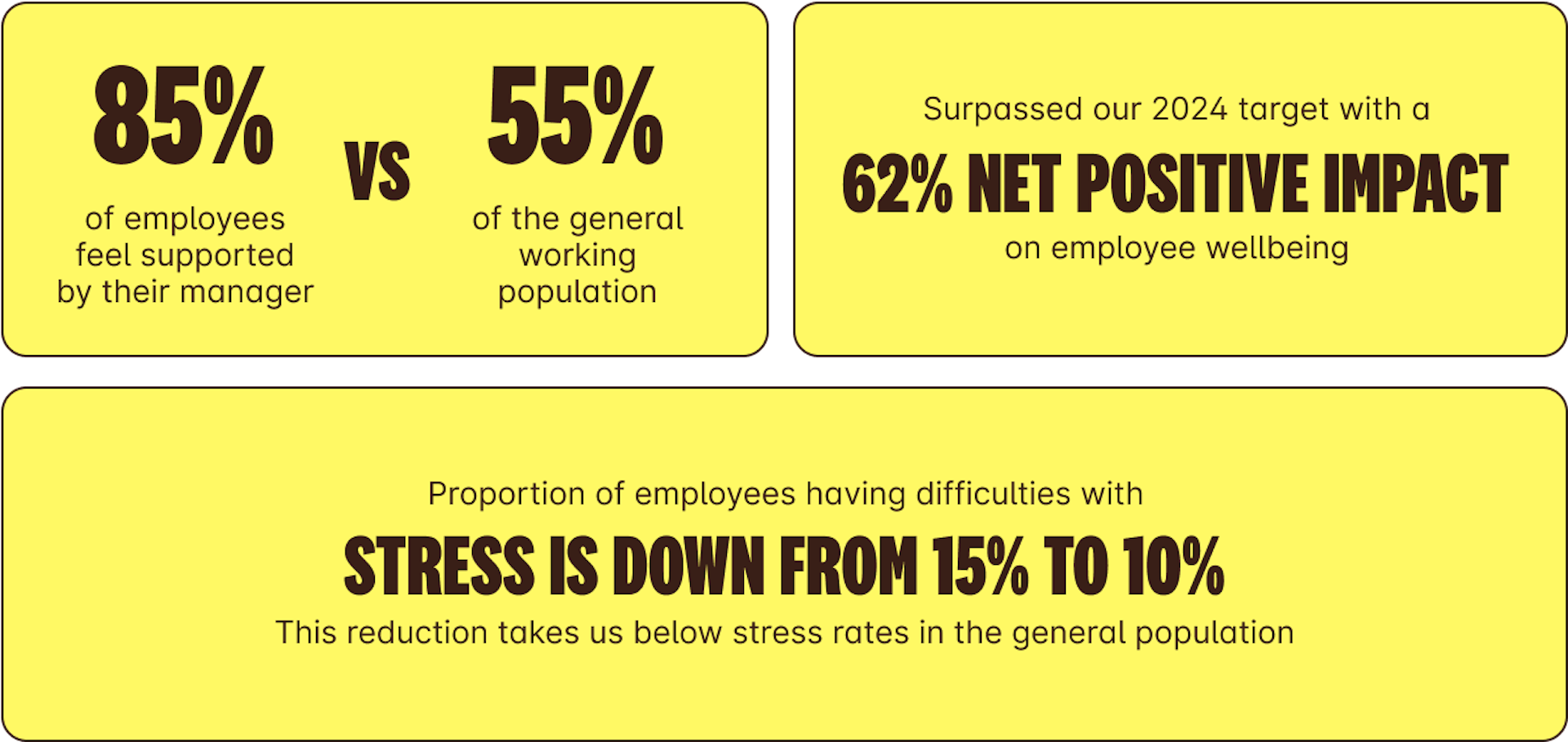
Our scalable strategies for success include:
- Prioritizing employee wellbeing as a key performance indicator for business success.
- Making senior leadership an active part of wellbeing initiatives to engage teams.
- Engaging our peer network of Wellbeing Champions who promote and support employee mental health.
What did we do?
Based on our data and industry trends, we targeted stress to improve the wellbeing and performance of our people. Alongside our existing employee benefits, we:
- Gathered qualitative feedback from roles and teams experiencing increased stress with our Professional Services team made up of in-house psychology and industry experts.
- Upskilled every manager on how to lead high-performing teams with live and online Unmind Manager training.
- Provided every employee with instant access to high-quality online therapy and coaching through Unmind Talk.
Shaping the future
Our Playbook is just the start. Our learnings are the foundation for our long-term strategy for success and how we support our clients to build high-performing teams.


What are the challenges?
As a scale-up in a fast-moving market, we’re navigating the changing world of work. Like our clients, our challenges include distributed teams, rapid advances in technology and the shifting macroeconomic climate. As we face turbulent times, how organizations support employee mental health is more important than ever for long-term success.
To achieve high performance, we need to engage with our people and support their wellbeing effectively using innovative, data-driven initiatives that optimise wellbeing investment.
Without strategy or investment, we, along with the wider workforce, face a greater risk of burnout, disengagement and poor health.
The current picture
Greater costs: Costs associated with mental health for organizations have increased by 25% since 2019.2
Skills deficit: Over two thirds of HR professionals don’t think managers can address mental health at work.3
Driving turnover: 61% of employees who left their job was in part or completely due to their mental health.4
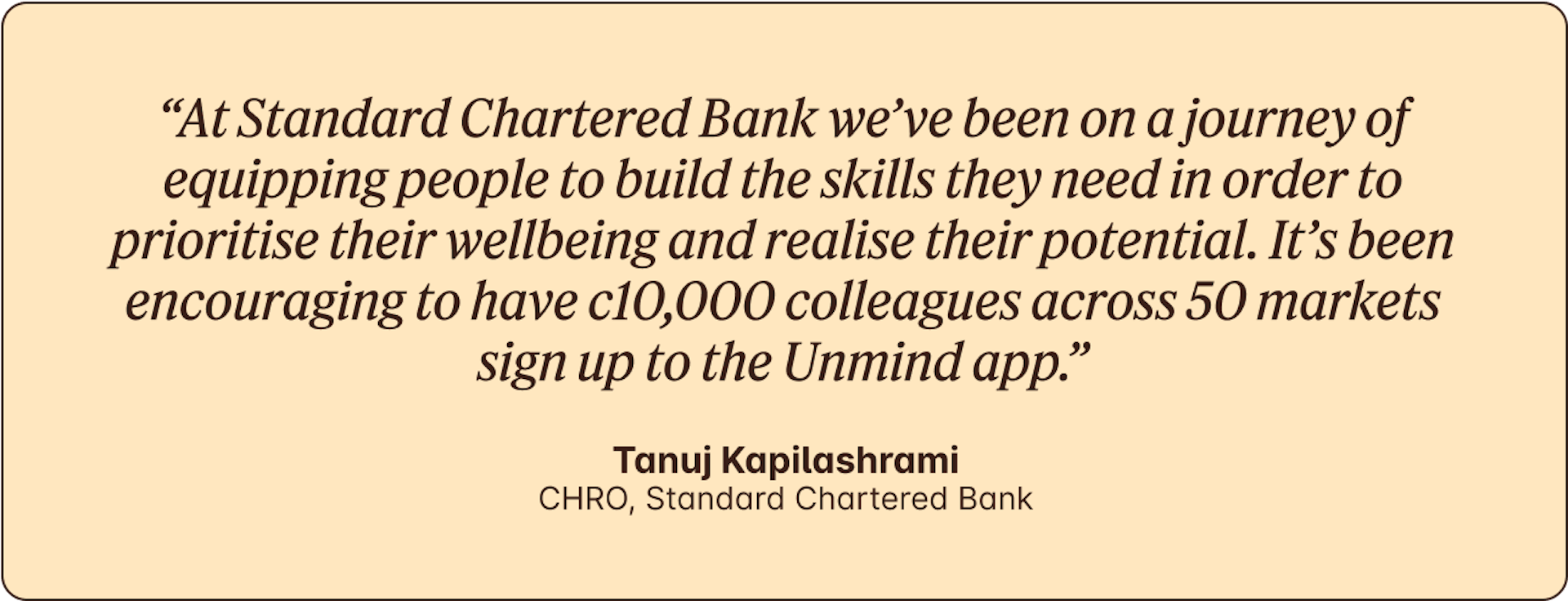
What did we do?
At Unmind, our mission is to create mentally healthy workplaces where everyone can flourish. This is as true for our teams as it is for the clients we serve.
In our Playbook, we show how our scalable enterprise solution makes our mission a reality by putting ourselves in the hot seat as a client of Unmind. We introduced new initiatives and optimised our investment by tracking employee wellbeing, collecting feedback and quantifying our impact using business metrics.
Driving success with employee wellbeing
Top 100 ‘happiest’ companies with greater employee wellbeing:


Our enterprise approach
Our platform addresses drivers of wellbeing for individuals, across teams and the wider organization.
Whole-organization support
To build for success, we need to shift the mindset from focusing solely on individual mental health to a broader, whole-organisation approach that includes the environmental factors that influence our wellbeing.
Backed by evidence
The Unmind Blueprint is our unified model based on the latest research and policy guidance that supports our whole-organization approach. This expert knowledge underpins how we measure and understand multiple drivers of wellbeing.
Driven by data
Developed by our in-house Science team, Unmind Insights assesses key drivers of workplace mental health and performance. Connecting wellbeing with performance, it also measures mental health-related absence, attrition and presenteeism.
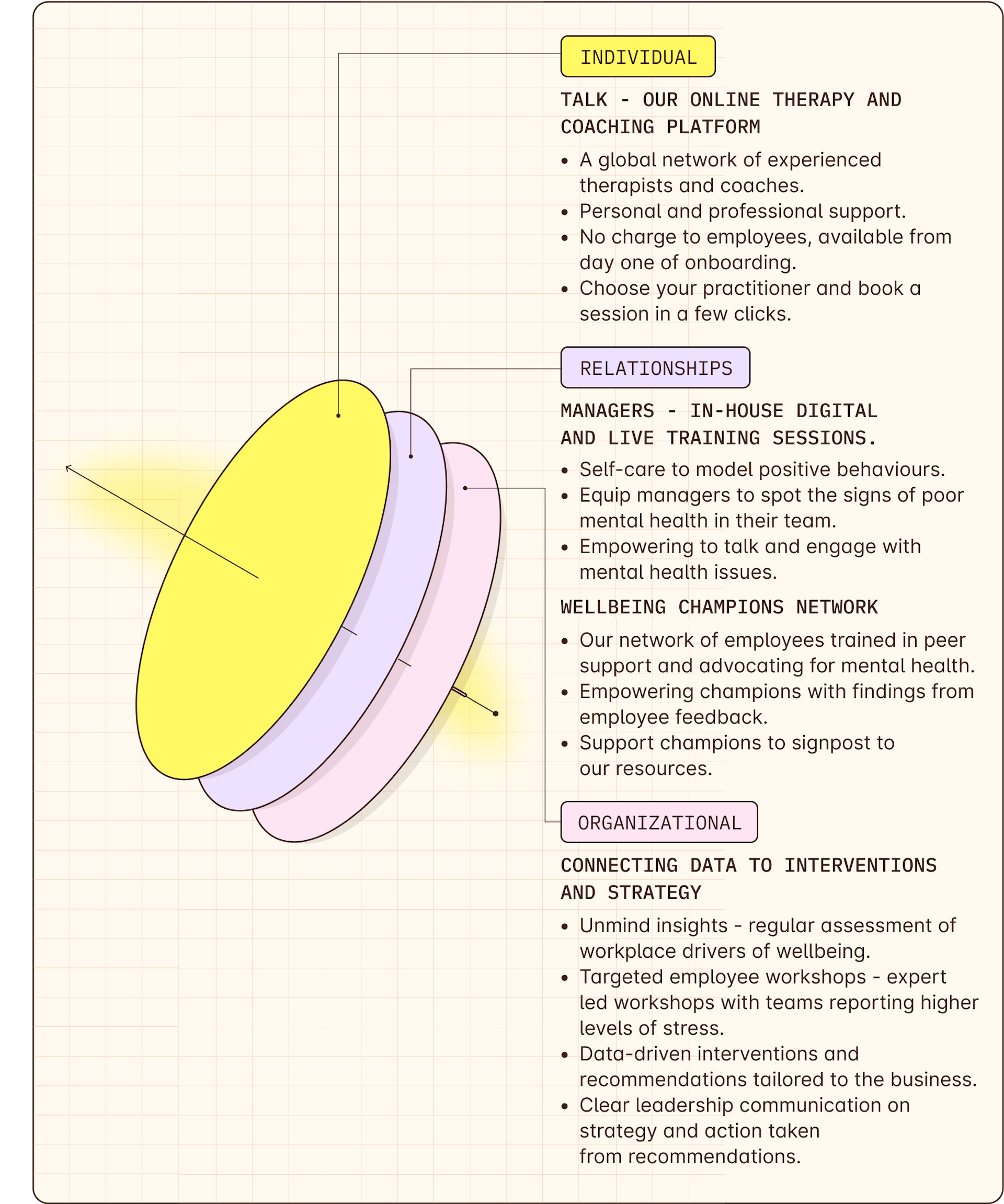

Absenteeism: Employees’ self-reported absence from work related to mental health difficulties.6
Attrition: Employees’ self-rated intention of leaving their current role in the next six months due to poor mental health.7
Burnout: As defined by the International Classification of Diseases (ICD-11),8 “A syndrome conceptualised as resulting from chronic workplace stress that has not been successfully managed.”
Net positive impact: Proportion of employees who report that their work has a positive impact on their mental health.
Mental health: As defined by the World Health Organization (WHO),9 “A state of wellbeing in which the individual realises [their] own abilities, can cope with the normal stresses of life, can work productively and fruitfully, and is able to make a contribution to [their] community.”
Presenteeism: Percentage of time at work negatively affected by poor wellbeing.10
Whole-organisation: Unmind’s holistic approach looks at the interplay between the individual, their work environment and its impact on mental health. Environmental factors include culture, relationships and physical environments.
Across the organization
We made wellbeing a critical business metric for our success. To improve wellbeing and performance, we approached our teams as we do with clients.
We examined systemic factors that impact employee mental health by collecting data, building expert recommendations and developing our strategy.
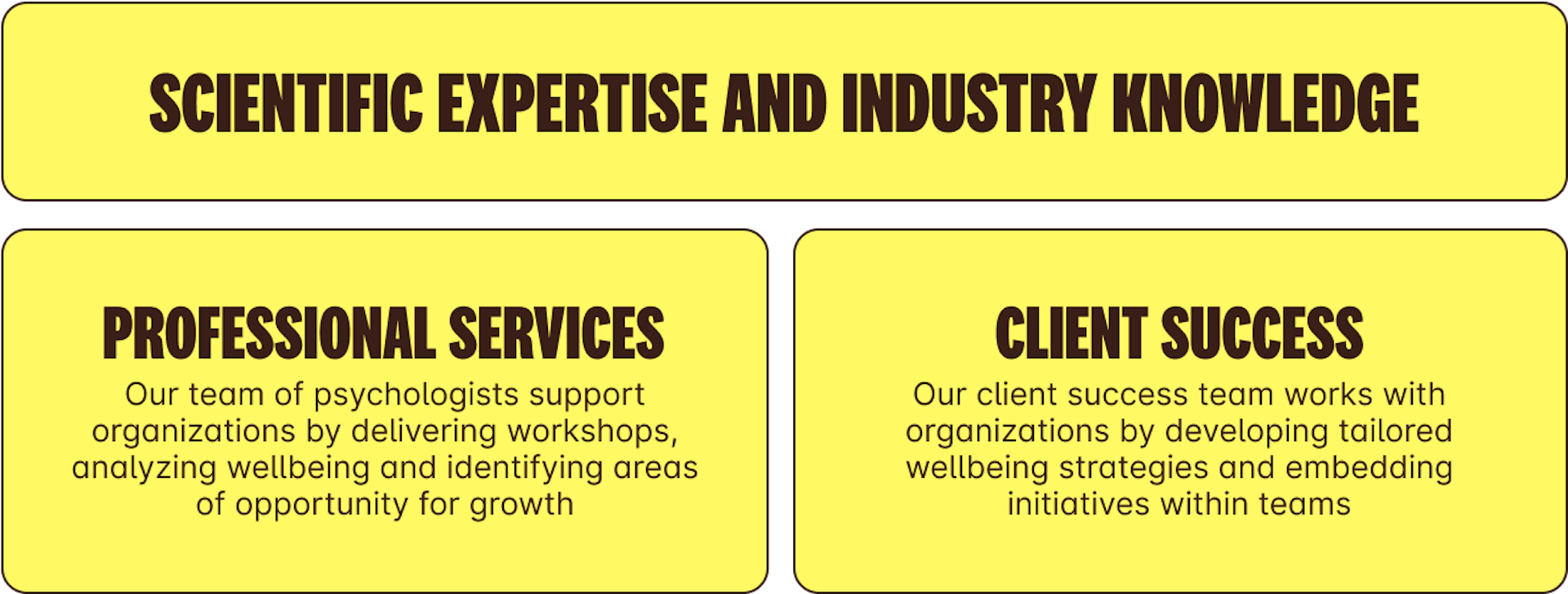
Workshops for qualitative feedback and recommendations
Our program of workshops run by Professional Services engaged with our people to find opportunities to improve team wellbeing.
We recruited employees based on roles and teams where our data showed increased levels of stress.
We found common themes across workshops to address challenges and manage stress in the business.
- Specific areas of development. Ways to alleviate stress for teams include upskilling communication, supporting continuous learning and managing workload more effectively.
- Better role and career path clarity and alignment with organisational goals to reduce stress and improve performance.
- Greater need for direction. A desire for greater support and mentorship balanced with the need for autonomy
Focus on manager support
From managing their own mental health to being leaders who motivate and engage their teams, managers need to be equipped to support wellbeing and lead high-performing teams.
In line with global trends, our data showed a relationship between manager support and risk of attrition. This means that greater investment in manager skills that support wellbeing and build relationships have a direct impact on organizational success.

In-house bite-sized digital content
Our Workplace of Tomorrow training upskills managers to:
- Gain skills to nurture and support their team.
- Support their own mental health.
- Create lasting positive change in the workplace.
Live self-care sessions
Our sessions equip managers with self-care skills to improve wellbeing and deliver great leadership. These sessions offered a space to reflect on the unique challenges of their role, get practical advice, and learn from one another.

Access to therapy and coaching
We recognize the role that workplace environment and culture play in employee mental health. We believe that successful organizations must create a culture that helps prevent problems and promotes wellbeing.
As part of developing this culture, we made therapy and coaching for personal and professional development easily accessible and free of charge with Unmind Talk.
We promoted Talk in our business with:
Proactive communication
We used all our employee channels to promote and engage Unminders with Talk, including regular promotion by leadership.

What did we find?
Improved wellbeing
Our investment has helped support our people and our organization during a challenging period of change.

With record levels of burnout globally13, we believe that employees should feel that has a positive impact on their lives and that this is a critical issue for improvement across industries.

Based on these global insights, we use the net positive impact of work on mental health as our critical metric for success.

How did changes in wellbeing support improved performance?
Our metrics showed improvement in areas of wellbeing associated with mental health-related absenteeism, presenteeism and attrition.
We compared scores to a sample of workers from across industries who completed Unmind's Organizational Health Benchmark to understand the current needs of the wider workforce.

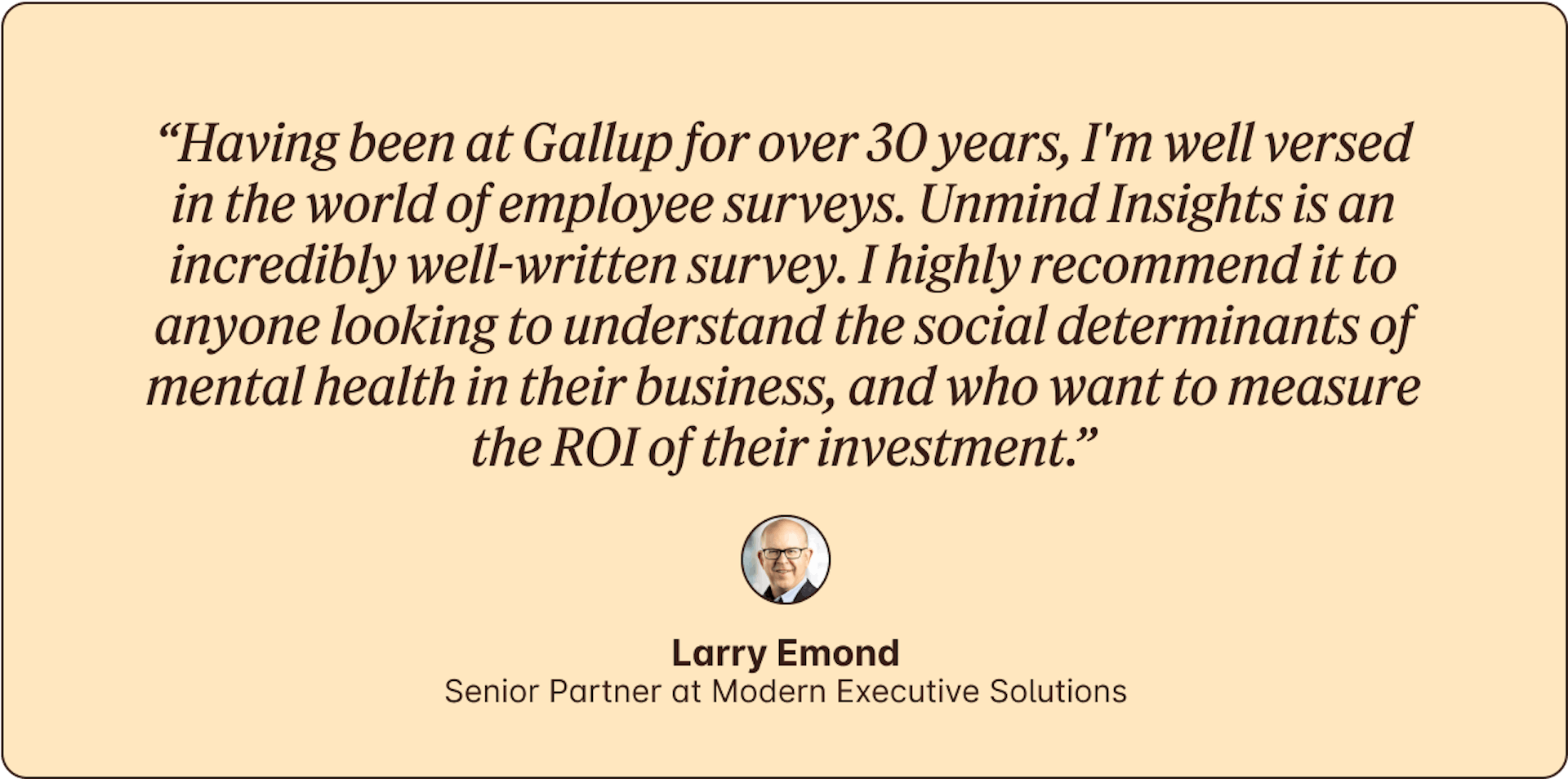
Cost savings
We measured the impact of our initiatives over six months and used this to estimate our cost savings for a year if we maintained these improvements.

By modelling our cost savings for different-sized organizations, we can see the potential cost savings across the workforce.
Indicative cost savings for larger organisations

Positive impact across initiatives
Employee workshops
- Positive feedback: employees benefited from the time to connect and troubleshoot.
- Practical and powerful actions identified to manage stress and improve performance.
Manager training19
- 31% increase in confidence in identifying and supporting employees with mental health challenges.
- 26% increase in knowledge of factors that influence a mentally healthy workplace.
- 17% increase in intention to take proactive steps to prioritise mental health.
Unmind Talk20
- High rates of engagement and satisfaction across the business.
- Over 90% of users would recommend Talk to their colleagues.
- Positive impact on professional and personal development.

Workshops - Unminder feedback
Team collaboration and communication
"It was helpful to break out and speak openly and transparently with your team members."
Validation and peer support
“Hearing shared experiences to validate what I was feeling/experiencing and knowing I wasn't alone."
Productivity
‘"Blocking out focus time has already been very useful, and I feel more productive as a result”
Unmind Talk
“Unmind Talk has helped me both professionally and personally. It has deeply helped me with work issues, career issues and stress. On a personal level, it has helped me to learn things about myself and how to deal with negative thoughts.”
“Really positively, helped me deal with work issues and build my confidence”
“Having coaching through Unmind Talk has been really beneficial, it enables me to think about my goals, explore my future and commit to action. It pushes me to have a growth mindset, boost my confidence and explore my potential.”
“Clearer on my career trajectory and goals, investing in planning for the future.”

Beyond the Playbook
To understand our results, we compared how levels of wellbeing compare to a sample of the wider workforce. We found that, across all drivers of wellbeing, Unmind employee wellbeing is above population levels.
Our findings illustrate the substantial room for growth across sectors in areas of wellbeing that drive performance and company-wide health.
Over a third of the general workforce feel they can’t discuss mental health in their organization.
1 in 4 lack support from their organization.
1 in 5 feel unsupported by their manager.
How our results compare to the general workforce

How we keep growing
Our playbook demonstrates the positive social impact and economic benefits of applying the Unmind approach and principles to organizations.
In a fast-paced environment, we implemented multiple, sustainable changes to our organization and saw improved mental health and performance in our teams.
Our impact and learnings from the Playbook shape our long-term strategy and how we support our clients.
Key learnings
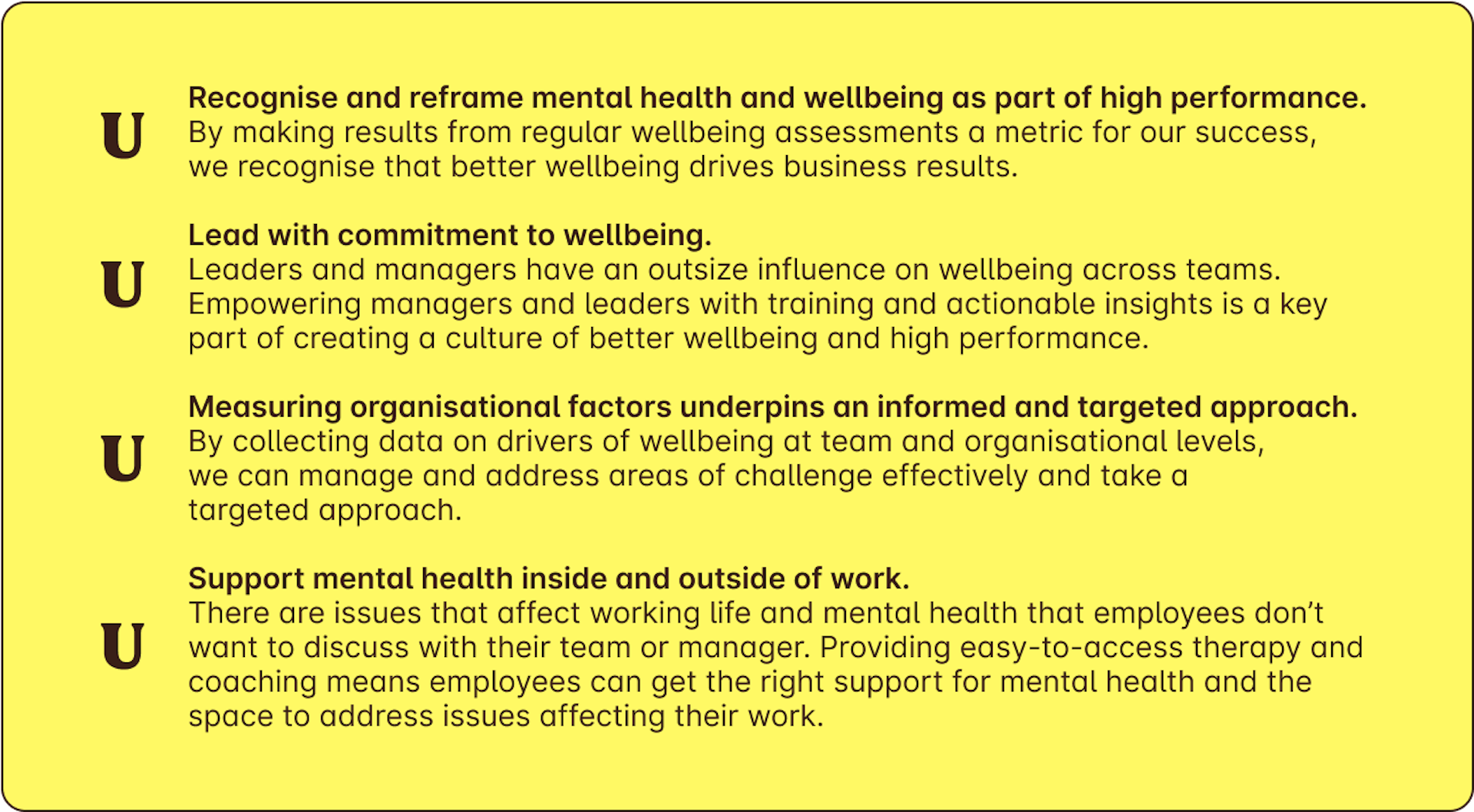

References:
[1] Based on estimated cost saving per year and average annual full-time wage of £84,000
[2] Deloitte. (2022). Poor mental health costs UK employers up to £56 billion a year. https://www2.deloitte.com/uk/en/pages/press-releases/articles/poor-mental-health-costs-uk-employers-up-to-pound-56-billion-a-year.html
[3] Chartered Institute of Personnel and Development (2022). Health and wellbeing at work 2022. https://www.cipd.org/globalassets/media/comms/news/ahealth-wellbeing-work-report-2022_tcm18-108440.pdf
[4] Deloitte. (2022). Mental health and employers: The case for investment – pandemic and beyond. https://www2.deloitte.com/content/dam/Deloitte/uk/Documents/consultancy/deloitte-uk-mental-health-report-2022.pdf
[5] De Neve, J. -E., Kaats, M., & Ward, G. (2023). Workplace wellbeing and firm performance. Wellbeing Research Centre, Oxford. https://ora.ox.ac.uk/objects/uuid:8652ce7e-7bde-449f-a5e7-6b0d0bcc3605/
[6] Absence measured based on response to: ‘Roughly how many days have you taken off work in the past 3 months due to poor mental health?’
[7] Attrition measured based on response to: ‘How likely are you to leave your current role in the next 6 months partly or wholly due to your mental health?’
[8] World Health Organization. (2019). International Statistical Classification of Diseases and Related Health Problems (11th ed.). https://icd.who.int/
[9] World Health Organization. (2004). Promoting mental health: Concepts, emerging evidence, practice. https://www.who.int/publications/i/item/9241562943
[10] Presenteeism measured based on response to: ‘In the past 3 months: To what extent has poor mental health affected your performance on days you've been at work?
[11] Chartered Management Institute. (2023). Better Management Report: Taking responsibility – why UK PLC needs better managers. https://www.managers.org.uk/wp-content/uploads/2023/10/CMI_BMB_GoodManagment_Report.pdf
[12] American Psychological Association. (2022). Work and well-being survey 2022. https://www.apa.org/pubs/reports/work-well-being/2022-mental-health-support
[13] Gallup. (2023). State of the global workplace: 2023 report. https://www.gallup.com/workplace/349484/state-of-the-global-workplace.aspx
[14] Gallup. (2023). HR's perception of mental health at work. https://www.gallup.com/workplace/508622/perception-mental-health-work.aspx
[15] Deloitte. (2022). Mental health and employers: The case for investment – pandemic and beyond. https://www2.deloitte.com/content/dam/Deloitte/uk/Documents/consultancy/deloitte-uk-mental-health-report-2022.pdf
[16] Evans-Lacko, S., & Knapp, M. (2016). Global patterns of workplace productivity for people with depression: Absenteeism and presenteeism costs across eight diverse countries. Soc Psychiatry Psychiatr Epidemiol, 51(11), 1525–1537. https://doi.org/10.1007/s00127-016-1278-4
[17] McGregor, A., Magee, C.A., Caputi, P., & Iverson, D. (2016). A job demands-resources approach to presenteeism, Career Development International, 21(4), 402–418. https://doi.org/10.1108/CDI-01-2016-0002
[18] We tested Unmind Insights with a sample (1,000) of adults in full-time employment in the UK, USA, Australia and New Zealand, recruited to reflect the diversity of our clients based on demographic background (gender, age, ethnicity) and professional status (manager status, sector). We used this data as a benchmark to compare organisations’ scores for each theme and overall score.
[19] Based on a sample of 24 managers.
[20] Based on a sample of 25 users.